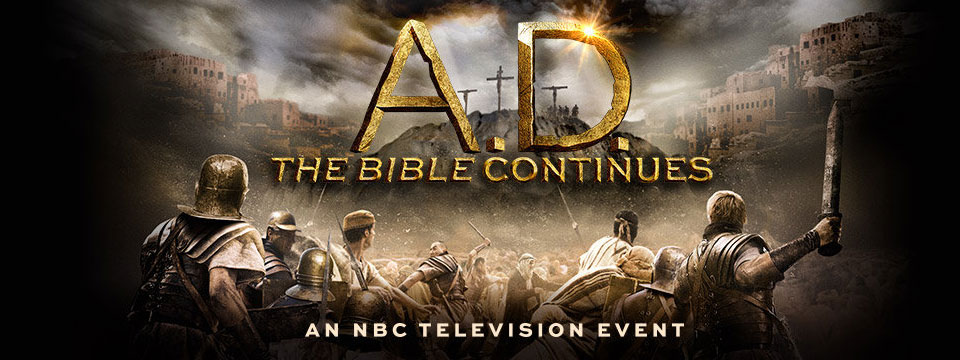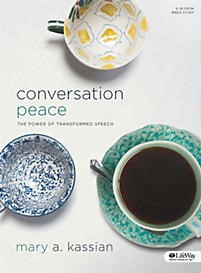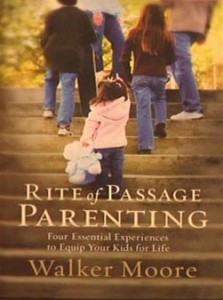
by Karen Kinnaird | Mar 17, 2015
Looking for a great new TV series to watch this spring? My husband and I attended a preview of the first episode of the upcoming series, A.D. The Bible Continues. Producing team Roma Downey and Mark Burnett were there to talk about their vision for the series. The first series The Bible which broadcasted in 2013 on The History Channel received more than 100 million cumulative views and received three Emmy Award nominations.
The Bible Continues is a 12-week series which will be aired on NBC beginning on Easter Sunday night, April 5, 2015. Ronnie Floyd, senior pastor of Cross Church in Northwest Ark. and president of the Southern Baptist Convention, notes, “A.D. is biblically-based, historically-supported and creatively-integrated as an epic story that will captivate generations globally. This drama is powerful, engaging, and INTENSE!”
The first episode of The Bible Continues includes the last moments of the Crucifixion, Judas taking his own life after betraying Christ, Peter denying Jesus and the Resurrection. Subsequent episodes will chronicle “A.D.”, the rise of the early Church associated with enormous faith, persecution, political intrigue, Roman oppression and the desperate Jewish revolt. The story is told through the eyes of the Apostles, Pilate, and Caiaphas. The majority of the content is from Acts 1- 10. The series will conclude with the conversion of Cornelius and will serve as the starting point for Season 2.
The series was filmed in Morocco. Downey said the set which included the temple and the city of Jerusalem was so extensive between the buildings, animals and hundreds of extras that she got lost at one point. She noted that the content was “lovingly researched to be historically accurate.” It was important to the producers to recruit an international cast, and they stressed the importance of diversity.
Burnett noted that we live in a day when many are biblically illiterate, and he hoped the series would draw in those who desire to learn about the Bible and those who are searching for spiritual direction in their lives. Downey described the film as “a great TV moment” and “a cinematic experience to be enjoyed in your living room.”
While this first episode remained true to the Biblical account, there was some creative freedom taken to portray some of the events, as is common in many Bible-based movies. In an effort to be inclusive, a cast from a variety of ethnic backgrounds was represented. For instance, John and Mary Madeleine are played by Africans. Paul is played by an Irishman. Of course, we know that most of the apostles were Jews from Galilee.
Also, darkness fell at the point of Jesus’ death, and the Bible states from Matthew 27:45 that darkness fell from the sixth until the ninth hour while Jesus was on the cross. In the episode, Caiaphas and his wife witnessed the curtain of the temple in the Holy of Holies tear in two when we know that only Levite priests were allowed in the temple proper.
One of the beauties of this series is that the executive producers partnered with Outreach to develop resources to help churches use this series as an outreach tool to the community. Check out www.shareadtheseries.com or www.outreach.com/AD. In addition to a Study and Guidebook, Scriptural reference guide, and Viewing Part Kit, many promotional materials are available. A church kit including sermons, access to streaming video clips that correspond with the sermons, planning guide and more is available.
I highly recommend the series. The quality is as good as any motion picture. The acting is excellent, and the character development shows a depth of emotion and life experience that we don’t see in other portrayals. Flyovers above the city of Jerusalem added to the special effects and creative cinematography.
Parents should note that some scenes are hard to watch, and while they are true to the Bible, they are violent and would not be suited for young children. Whether you are familiar with the Bible or not, I encourage you to watch. Read for yourself the verses that correspond to each episode and gain a whole new appreciation for the birth and rise of the church. The greatest story ever told is still the greatest story ever told!
Photo credit: NBC

by Karen Kinnaird | Mar 10, 2015
Apologize. David Petreaus did it. Tiger Woods did it. Justin Bieber did it. We’ve had to do it ourselves, and it’s hard. Some apologies are well done, and some are a “sorry” sorry.
What is the correct way to apologize? Mary Kassian in her book Conversation Peace suggests the following:
- Identify what we have done wrong. Be specific. Perhaps it was a critical word, a poor attitude or a harsh tone?
- Include an admission of guilt. “I was wrong.” In doing this we accept responsibility for own actions.
- Ask for forgiveness. The tone of the apology should convey genuine grief. This should include a promise to not repeat the action or work towards not making the same mistake again.
Some apologies are counterfeit. Evading responsibility or blaming others is not a proper apology. Counterfeit apologies do little to mend relationships and resolve conflict. It some cases, they add fuel to the fire. No apology is better than a fake one. Don’t say you’re sorry if you don’t mean it. Kassian notes that counterfeit apologies fall into 3 categories:
- Deny that the offense occurred. This attempt at apologizing implies the other person is wrong or misunderstood us. “I’m sorry you took it that way.”
- Excuse the behavior. This type of apology tries to make an excuse in order to justify our own behavior. “I’m sorry, but…”
- Attack the other person. In this approach we blame the other person or make their offense worse than ours. “I’m sorry but you made me do it!”
Communication experts tell us that only 7 percent of communication is verbal. Body language and facial expressions contribute 55 percent, and tone contributes 38 percent of our message. An apology with crossed arms and lack of eye contact will not be well received. An apology should be a sincere attempt to express heartfelt feelings of regret and take responsibility for our actions.
Although the word “apology” is not in the Bible, the concept is. In the Sermon on the Mount Jesus said, “If you are offering your gift at the altar and there remember that your brother has something against you, leave your gift there in front of the altar. First go and be reconciled to your brother; then come and offer your gift.” Proverbs says 28:13 says, “He who conceals his sins does not prosper, but whoever confesses and renounces them finds mercy. Broken relationships hinder our relationship with God and grieve God’s Spirit.”
Is there an apology you need to make? Is there a relationship in your life that needs repair? Your spouse? Your child? Your parent? A friend or co-worker? Take the initiative, do it right away and make it a face-to-face apology. This will open the door to diffused anger, open communication, and healing. As Christians, let’s set a good example and apologize well.

by Karen Kinnaird | Feb 23, 2015
 Are you minding your mouth? Do you gossip? Nag? Complain? Talk too much? Fail to listen? If so, the book Conversation Peace is for you! Published by LifeWay, this award winning, interactive Bible Study geared to women was newly revised in 2014.
Are you minding your mouth? Do you gossip? Nag? Complain? Talk too much? Fail to listen? If so, the book Conversation Peace is for you! Published by LifeWay, this award winning, interactive Bible Study geared to women was newly revised in 2014.
Author Mary Kassian is an award winning author, popular speaker, and a distinguished professor of women’s studies at Southern Baptist Seminary. She has published several books, Bible studies and videos, including: Girls Gone Wise, In My Father’s House: Finding Your Heart’s True Home, Conversation Peace, Vertically Inclined, and Feminist Mistake. More information about Kassian can be found at www.girlsgonewise.com.
The Bible sets a very high standard for our speech. In this study, Kassian notes that communication problems are spiritual problems requiring spiritual solutions. The book is all about speech transformation and relying on God’s power to transform us from the inside out. She offers biblical principles to help women revolutionize their speech habits and improve their relationships. The book is divided into six sessions:
- Power of Navigation: Your tongue is a steering mechanism. It can be used as a weapon or a tool. Learn how you can be better able to avoid disaster and direct your life along the right course.
- Power of Cause and Effect: The words we speak are connected to what lies in the store house of our hearts. Our words and behavior reveal our thoughts and attitudes. What comes out of our mouths when we are particularly irritated, exhausted or stressed out? How do we react when extremely angry? Our hearts must be transformed and filled with the truth of God’s word.
- Power of Exchange: New patterns of thought must be placed in our minds. We must identify the lies we believe and replace them with seeds of truth, abundance, grace, gratitude and excellence.
- Power of the Open Gate: Learn how to tear down barriers such as quarreling, controlling and making assumptions in order to pave the way for peace, humility and patience. Improve your relationships.
- Power of Construction: Learn to encourage and affirm instead of criticizing others. Nourish relationships to build harmony and unity.
- Power of Instruction: Become a person who has a teachable spirit and has a well-instructed tongue.
One of my favorite teachings of the book is the P-48 test. Kassian teaches that Phil. 4:8 can be used as a filter to test the goodness of the seeds of thoughts, beliefs and words. Are the seeds pure, right, admirable, and true? After shaking through the filter should they be thrown out or planted?
“Whatever is true, whatever is noble, whatever is right, whatever is pure, whatever is lovely, whatever is admirable- if anything is excellent or praiseworthy- think about such things” (Phil. 4:8).
This is my second time to facilitate this Bible Study, and I highly recommend it. The practical and interactive Bible Study workbook is designed for six weeks of study and seven sessions. It’s perfect for individual study, small groups or a family study. Although geared to women, anyone would benefit from the principles taught. Kassian weaves in “tongue tonics” which are practical concepts and skills to help communication such as listening skills, the correct way to apologize, and the importance of tone and body language. The book includes leader helps and Scripture memory cards. Additional resources are available at www.conversation-peace.com and www.lifeway.com/conversationpeace.
Do you need some Conversation Peace?

by Karen Kinnaird | Jan 22, 2015
 Something is radically wrong with our kids. School shootings, poor tests scores, lack of motivation, anger, drugs, sex and vulgarity. According to author, Walker Moore, “America’s youth culture is spiraling downward as never before.”
Something is radically wrong with our kids. School shootings, poor tests scores, lack of motivation, anger, drugs, sex and vulgarity. According to author, Walker Moore, “America’s youth culture is spiraling downward as never before.”
I believe every parent needs to read this book! Walker Moore is an internationally-known youth culture expert, author, and speaker with more than 30 years of experience. He integrates humor, wisdom, and experience along with his own personal family’s journey to help parents with tools to develop “capable, responsible, self-reliant children.” In Rite of Passage Parenting, Moore outlines four essential experiences to equip kids for life:
1. Rite Of Passage: Moore points out that each child has a deep desire to grow up. In our culture, adolescent responsibilities are delayed as long as possible, there are low expectations and a lack of consequences for failure to meet what few expectations exist. This contributes to a state of confusion in teenagers resulting in kids choosing their own rites of passage to prove they are grown up. Unfortunately, their choices are getting them into trouble. Moore suggests a rite of passage parenting process involving five marks of maturity that moves children into adulthood.
2. Significant Tasks: Kids today desperately need tasks – special assignments to demonstrate their worth. Moore points out that, “The loss of significant tasks has left kids lacking in knowledge and skills for responsible living.” Children should be given tasks that gradually increase in significance so that they will be prepared to accept God’s bigger purpose for their lives.
3. Logical Consequences: Kids must experience logical consequences to their actions in order to learn to make wise choices based on right values. Walker addresses four issues here: Language (profanity), possessions (materialism), finances (entitlement, lack of work ethic), and sexuality (promiscuity, loss of innocence). Moore recommends the use of contracts/testaments – written documents outlining an action with a right value along with the logical consequence if that action is not met.
4. Grace Deposits: Moore points out that it takes 49% law and 51% grace to raise a child. Grace deposits of statements and actions that build up a child’s worth are essential. Deposits into a child’s inner spiritual account will affirm them. Grace deposits can bring the rebellious child back under the parents’ authority. The very important role of the grandparent is discussed throughout the book. Grandparents are to build worth and value into their lives of their grandchildren.
In Rite of Passage Parenting, Moore not only identifies key cultural issues, but also offers an explanation as to why they exist along with very practical solutions. He suggests viewing a child’s life as a building project with the parent as the contractor. Parents are responsible for “character construction.” Kids today have a myriad of subcontractors with differing and destructive values and beliefs influencing them. By laying the foundation of right values and then adding right beliefs, the result will be a capable, responsible, self-reliant adults. Rite of Passage Parenting can be purchased at www.awestar.org.

by Karen Kinnaird | Jan 6, 2015
Twas the night before Christmas. After a long day’s drive, our adult children met us at my parent’s home in Nashville. It had been months since we were all together. We had a nice dinner and enjoyed opening beautifully wrapped gifts. Later that night the children were all snug in their beds while visions of new clothes, new boots, electronics and cash danced in their heads. When on my night stand my I-phone arose with a clatter! I sprang from the bed to see what was the matter! I tore open the email and clicked the inbox. When what to my wandering eyes should appear? The VISA bill.
More rapid than eagles the email it came. The bill whistled and shouted and called them by name: Christmas Gifts! Stocking Stuffers! Gift Wrappings! Holiday Outfits! Parties! Decorations! Additional groceries! Travel! Pet sitting!
Unfortunately in our culture, Christmas has become a time of commercialism, stress, and over spending with expectations of creating the perfect holiday. Here are some of the sad statistics regarding Holiday spending:
- According to the National Retail Federation, the average household spends $730 on gifts, decorations and other holiday purchases.
- According to an article by NBC news, some 45% of those polled said the holiday season brings so much financial pressure, they would prefer to skip it altogether. Almost half said their level of stress related to holiday expenses is high or extremely high.
- According to Consumer Reports, shopping with credit cards during the holidays often leads to overspending by an average of 16%. This is part of the reason that the same Consumer Reports survey revealed that 13.6 million Americans were still paying off holiday purchases from 2009 in November of 2010.
Unfortunately, the joyful Christmas season can turn into a long season of regret and resentment. Over spending and debt weighs us down emotionally and causes stress and worry. Proverbs 22:7 says, “The borrower is a slave to the lender.”
Fortunately, my Christmas Eve had a happy ending. With a wink of my eye and a twist of my head, soon gave me to know I had nothing to dread! Many years ago, my husband and I learned a valuable lesson. Each January, we calculate a reasonable and realistic amount needed for the holidays. We divide that by 12 and begin to tuck that amount away each month. By the time November comes we pay cash out of our Christmas envelope and treat online purchases like cash. Once the money is gone, the spending stops.
Here are some tips to a debt-free Christmas:
- Plan early. Set your budget now and stick to it. Include all holiday related expenses.
- Make a list. Write down the names of every person you will purchase a gift for and assign a budgeted amount.
- Start saving monthly.
- Place your holiday cash in an envelope. Separate out the cash needed for online purchases so the bill can be paid in full when it arrives.
Like many, we want to give our family a nice Christmas while being good stewards of what God has given us. My desire is to simplify. As Christians, our focus should be on the worship and celebration of the birth of our Savior. Eliminating holiday debt brings joy and peace. It helps us to be content with what we have. Let’s honor Jesus’ birthday by being good stewards for Him. Then, we can all say, “HAPPY 2015 CHRISTMAS TO ALL AND TO ALL A GOOD NIGHT!”
Reference: “A Visit From St. Nicholas”, Clement Clarke Moore, 1822.






